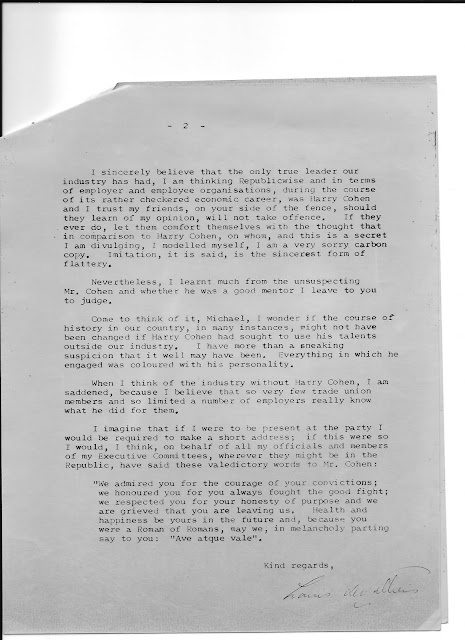It may be too big a leap to write about the relationship between employers and the trade unions: most of the time they rub along reasonably amicably and it is only now and then that the relationship descends into acrimony – thankfully less often than it used to be.
I have spent a bit of time recently sorting through some old papers as you will have seen from an earlier blog. I have written a bit about my maternal grandfather’s military service in WWI but this is about his career starting as a craftsman and a trade union member and ending as the Chief Executive of a furniture factory and retail stores – and his changing relationship with the trade union movement.
He trained as a cabinet-maker in the East End of London before the war. His father was a cabinet-maker before him, no doubt training in Poland from where he emigrated in the 1890s.
Grandfather was a member of the Labour Union – it was then the “National Amalgamated Furnishing Trades Association” and he was a member of the East London United Branch. The motto (I suppose it would now be a ‘mission statement’) was “Unity is strength” “Strength united is stronger”. (Through a series of mergers, this is now part of the GMB.)
In the early 1920s, when my mother was a baby they decided to emigrate to South Africa and my grandfather was duly signed off from the Union “having paid all dues and demands”.
I know that he obtained employment in Johannesburg as a cabinet-maker as I have a reference provided by an employer. How he transitioned from craftsman to entrepreneur I have no idea but I do know that he always had good relationships with the Unions and was highly respected in the trade.
One of the documents in the pile is a letter written by I assume the leader of (the South African) Federation of Furniture and Allied Trade Union offering apologies for not being able to attend my grandfather’s retirement reception. It is a very moving letter for a granddaughter to read – especially in the adversarial, aggressive and sometimes poisonous environment we live in today.
As a Union man and a Labour supporter he would have been horrified at today’s betrayal of the Jewish community evidenced by the upsurge of anti-semitism from the left of the Labour party.
The history of my grandfather, his Polish parents and the rest of the family highlight the significant contribution made by immigrants, in this case Jewish immigrants, to the societies into which they move. Of the eleven children there were several successful entrepreneurs, one corporate bigwig (in Canada) and Professor of Applied mathematics in the USA.
They all made their way in the world. Immigrants are ambitious and resilient you see.
I attach a copy of the letter.







